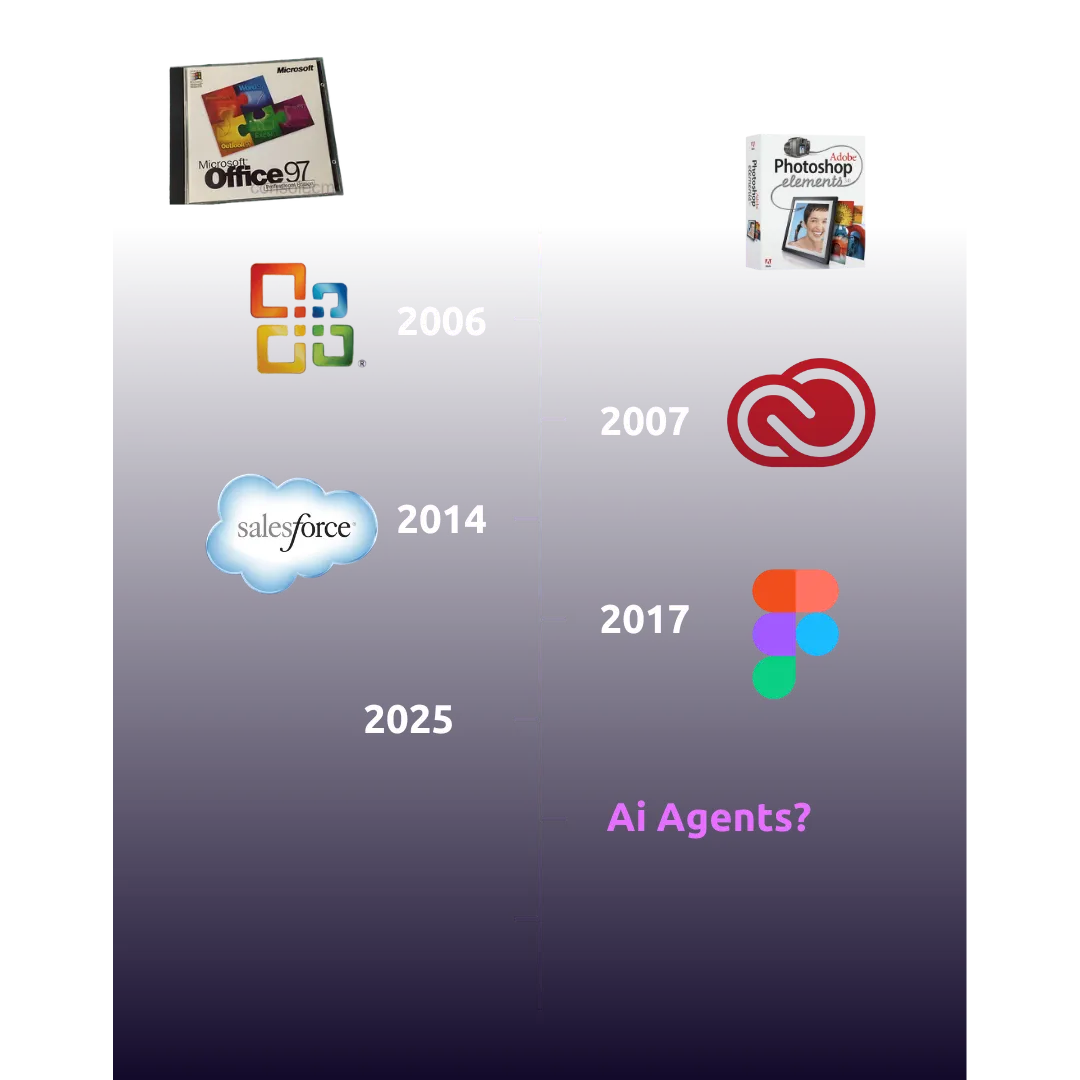Thank you! Your submission has been received!
Oops! Something went wrong while submitting the form.

In the 1980s and 90s, boxed software became a popular way to distribute software, whether it was gaming software, multimedia applications, or office tools. Companies like Microsoft, Adobe, and Corel rose significantly on the back of selling boxed software to millions of consumers and businesses.
In the 2000s, cloud computing and SaaS began their meteoric rise. Digital downloads, cloud-based storage, and computing simplified the process of purchasing and using software. No longer was there a need to buy a physical CD-ROM or transfer files via USB—you could access software within a few clicks.
Microsoft Office 365, for example, eliminated the need for local installation, while companies like Hubspot, Zendesk, Atlassian, and Adobe Creative Cloud revolutionized their respective industries. Today, there are approximately 337 SaaS unicorns, and this number is rapidly growing.
So what's next?
According to many, the answer is AI agents.

If we're a good fit, we back you, to share the risk (and the costs) of building your startup, which means your success is our success. Like we did with these starts.
.webp)
"The bull case for AI agents to be bigger than Saas, is SaaS still needs people to operate the software. The argument here is with AI agents you don't just need to replace the software, it's going to eat the payroll."

"AI agents will become the primary way we interact with computers in the future. They will be able to understand our needs and preferences, and proactively help us with tasks and decision making."

"Agents are not only going to change how everyone interacts with computers. They’re also going to upend the software industry, bringing about the biggest revolution in computing since we went from typing commands to tapping on icons."

"Vertical AI Agents Could Be 10X Bigger Than SaaS. Every SaaS company build some software which a group of people use. The vertical AI equivalent will be the software plus the people."

"Last year was all about chat. The way the world looks soon is that we will have hybrid teams that consists of humans and consists of AI agents."
An AI agent is essentially a bot trained to perform tasks much like an employee at your company. These bots can listen, learn from interactions, and get smarter the more they are used and trained. They excel at repetitive tasks, handling them with speed and precision.
The term ‘vertical’ refers to AI agents built for specific industry applications or verticals. As businesses increasingly automate their processes, vertical AI agents are poised to bring about a dramatic shift in how people work. However, building these agents requires industry insiders who understand inefficiencies and opportunities for automation within their fields.
Think about your own job. What tasks do you and your colleagues perform on a daily basis? What could be delegated to a smart robot? The answer is likely: quite a lot.
We would love to talk about how we could bring it to life with you.

While ChatGPT is good at answering questions using the power of internet knowledge, AI agents go a step further. They are goal-driven and can proactively accomplish tasks, interact with other tools (your email, accounting software) without waiting for specific instructions.
For example, an AI agent with a set objective will independently ask the questions it needs to get its job done, rather than waiting for you to request help. This makes AI agents more autonomous and versatile in achieving specific outcomes.

In many cases, yes—AI agents can be packaged as SaaS products, available via subscription or usage-based pricing. However, when people talk about AI agents surpassing SaaS, they often mean that the software of the future will be built on the backbone of AI-driven thinking and learning.
This contrasts with traditional SaaS, which relies on pre-coded workflows and algorithms. The key difference is that AI agents bring dynamic, self-improving intelligence to the table, rev
Vertical AI agent startups are emerging rapidly, but we don’t yet have a roster of widely recognised companies dominating this space. Some examples of promising startups and their use cases include:
Brico: Brico is a platform that streamlines the financial licensing process for fintech companies. By automating tasks such as new license applications, maintenance, and renewals.
Sierra: Sierra develops autonomous AI agents that assist customers in resolving issues and completing tasks without human intervention, aiming to enhance efficiency and customer satisfaction.
If you’ve identified an inefficiency in your industry, the next step is to figure out how to build an AI agent. The landscape for building AI agents ranges from free or low-cost options to highly expensive, custom-built solutions. Let’s explore this landscape and identify where your project might fit.
There are two primary decisions to make when defining how you’ll build your AI agent:
Choosing a Language Model (LLM): Is your agent going to be built on top of ChatGPT, Microsoft’s LLM, Google’s Bard, or another language model? Each option has strengths and weaknesses depending on your specific use case.When selecting an LLM, consider factors such as accuracy, adaptability, integration options, and cost. For example:

Best for general-purpose AI agents with strong conversational skills and extensive knowledge. It’s versatile but can sometimes produce verbose or overly generic outputs. Commonly used in B2C AI agents.

Ideal for enterprises requiring robust integration with Microsoft products and enterprise-level security.

Focused on cutting-edge contextual understanding and dynamic responses, suitable for industries like marketing or customer support. Good for agents working on top of the Google suite (Gmail, Calendar e.t.c.)
Development Approach: Will your AI agent be full-stack, no-code, or a simple plug-in built on top of an existing GPT-like platform?

Best for complex AI agents requiring unique features, integrations, and scalability. This approach gives you full control but demands significant resources and expertise.

Perfect for smaller teams or startups wanting to deploy quickly and cost effectively. Platforms like Bubble, Flutterflow and Xano are ideal in these situations.

Suitable for businesses seeking to extend functionality with minimal setup. You can use pre-built solutions, integrate APIs, or leverage platforms like Jasper AI to create specialised agents without starting from scratch.
.webp)
We use no code tools like Bubble.io, Flutterflow and Xano, combine it with LLM frameworks such as ChatGPT and build full stack custom integrations to cost effectively and time efficiently build highly functional and performant AI agents. We apply product strategy to builds to ensure we are building agents which meet a market demand and bring moments of delight to the user.
We look for people who see opportunities within their industry and help them bring AI agents to life. And we invest in early stage AI Agent companies because we don't want to capital to be a barrier to launch.